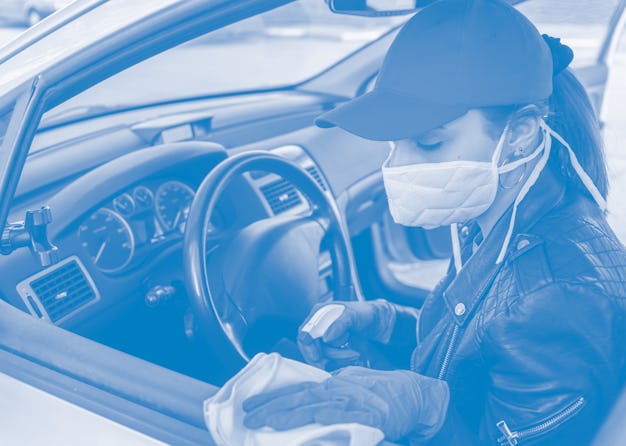Culture
Uber wants your help sanitizing its drivers' vehicles

270K
The number of canisters of wipes purchased by Uber.
Today Uber announced a partnership with Clorox to provide disinfectant wipes in vehicles across the U.S., to be used as a preventative measure against the spread of COVID-19. Uber has purchased 270,000 canisters of wipes, which will be delivered to drivers over the next three months.
“As we navigate a new normal and cities continue to reopen, we want all Uber users to travel with confidence,” Uber says. “That starts with clean cars.”
Riders will receive an in-app notification before their car arrives if the driver has been provided with Clorox wipes. Uber is suggesting that passengers wipe down high-touch surfaces like seat belt buckles, window buttons, and door handles.
Given that coronavirus infection rates are in many places just now reaching all-time highs, it’s still best to avoid ridesharing when possible. But when hopping in a car feels unavoidable, you’ll want every precaution to be taken to keep you safe. Uber’s doing a pretty good job at making the best of a situation that’s very bad for ridesharing in general.
Building on other precautions — Uber knows you don’t feel safe in the back seat of a stranger’s car right now. To that end, it's been releasing plenty of app updates to ensure both riders and drivers are taking the pandemic seriously.
The Uber app now includes a checklist that drivers must confirm they’ve completed — including wearing face coverings and other sanitary measures — in order to start accepting rides. Uber even developed specialized technology to check for drivers are wearing masks by getting them to take a selfie.
It’s a bad time for ridesharing — Uber and the ridesharing industry as a whole have not been doing all that well amid the ongoing pandemic. It turns out the vast majority of people don’t feel comfortable sharing the back of a car when COVID-19 might be waiting on the upholstery or door handle.
Uber lost more than $2.9 billion during the first quarter of the year, thanks to an 80 percent drop in ride-hailing customers. Lyft, Uber’s most direct competitor, was hit so hard by the pandemic that it was forced to lay off nearly a thousand of its workers in April.
Uber says the Clorox initiative is coming first to Atlanta, Chicago, and New York City — three hotspots for the virus — but will hopefully expand to other cities in the near future. It should hopefully provide some much-needed peace of mind for drivers and riders alike.